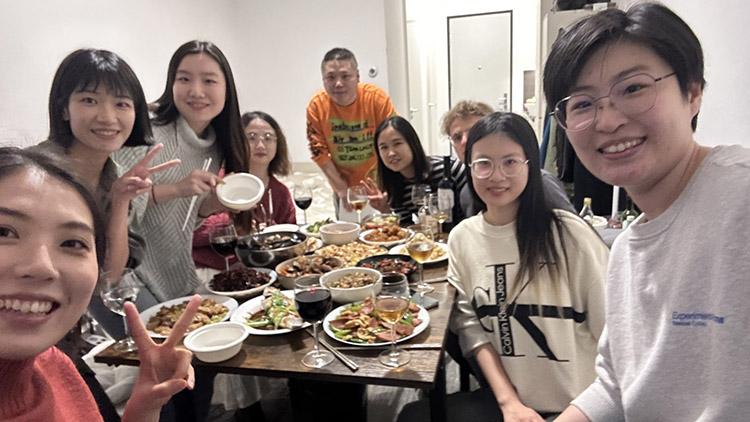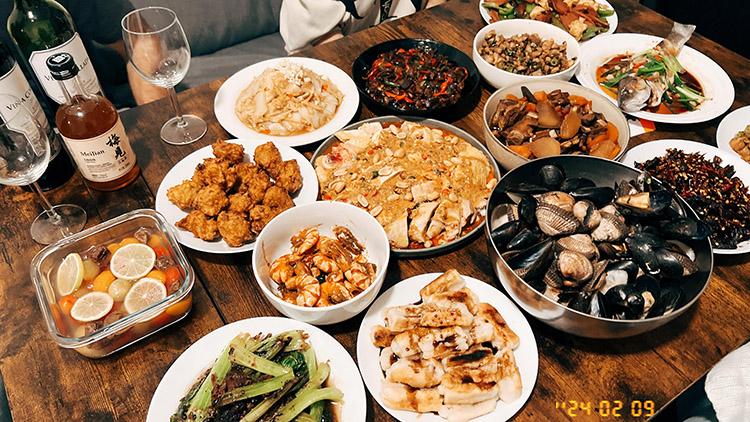The Year of the Dragon
Students' Chinese New Year dinner includes red underwear and rice wine

Friday afternoon. The smell of mala soup and the number of bikes parked at the entrance reveal that something special is about to happen at a student complex in Hoograven. As I enter my friend Wade's studio, the table is already full of steaming Chinese food. A Master's student in Business Development and Entrepreneurship, Wade spent hours in the kitchen preparing a New Year's Eve dinner alongside six other students.
Blushing, I pull out my meagre contribution: a few bottles of soju (a Korean rice drink), mochi balls, and two bags of frozen dumplings. Nevertheless, they welcome me with open arms, in Chinese fashion.
Travel or study
Everyone who lives in China gets at least one week off around the New Year to gather with their families and eat dishes which are believed to bring good luck, such as rice cake and "long-life noodles", together. During those parties, they wish each other a prosperous year and give each other red envelopes with money.
This is the first time Wade's friends are celebrating the most important Chinese holiday without their families. "It's a weird experience," says a Master's student in Banking & Finance. "Normally. you only meet up with your friends after the third or fourth day of the new year."
Some Chinese students fly back and forth for the annual family reunion, but most celebrate it in the Netherlands. "We are only here for one year, so our family doesn't mind us not coming this one time," says Master's student Remi. Although family is important in Chinese culture, in this case, it has to give way to another core Chinese value: education. "Our parents find it essential that we get good grades, so they would not want to see us play truant because of the New Year".
But that is not the sole reason for staying here, adds the student next to me: "Now that I am studying in the Netherlands, I would rather spend my time and money travelling around Europe". Several students present at the dinner spent their Christmas holidays in southern and eastern Europe instead of going back to China.

Quenching with soju
Dinner is served after the first round of peach liqueur. The table is filled with dishes from all corners of China: three students from the Northeast have prepared soup with carrot and radish, lettuce with garlic in rice vinegar, a fried fish, shrimp, and chicken in a slightly spicy creamy sauce. A student from the inland province of Sichuan has brought deep-fried rice cake in brown sugar and a serving of beef jerky with dried chillies and numbing Sichuan peppercorns. The student next to me tries to quench the spiciness with soju. "We don't use chilli at all in the Northeast."
It's Remi's birthday after midnight. Although she gets an enthusiastic "Happy Birthday" from her friends, she has reasons to be a bit tense too. Each Chinese year is symbolised by one of the 12 zodiac animals. This year - the Year of the Dragon - has the same symbol as her birth year, which is believed to put her at risk of adverse events.
The best protection: wearing red clothes. She says a friend has already given her a set of underwear in the lucky colour. Wade was also born in the year of the dragon and bought red pyjamas. But that's probably not going to help him, he says, laughing. "It only works when someone gives you red clothes as a present."
Dumplings
After two and a half hours, they manage to eat about half of the food, but it is time to clear the table. The most important dish of the Chinese New Year, homemade dumplings, still has to be cooked.
Meanwhile, they go on drinking, and the conversation topics change to going out and hitting on people at the club. Some of the students want to go into town tonight, but I doubt they will make it with such an extensive dinner schedule and a fast drinking pace. But that turns out not to be a problem. "Chinese New Year officially lasts for a fortnight, so we can go out tomorrow or next weekend too!"